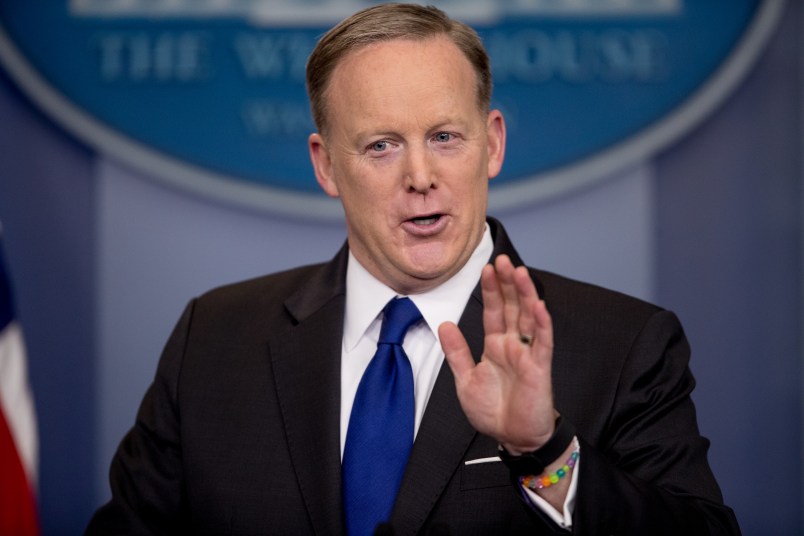WASHINGTON (AP) — The Trump administration declared Friday that it wasn’t pursuing a strategy to push Syrian President Bashar Assad out of power, making clear its focus is on defeating the Islamic State group.
White House press secretary Sean Spicer said the U.S. approach was being driven by a new “reality” and that Assad’s future had to be a decision for the Syrian people. Similar statements were made earlier by U.S. Cabinet members speaking in Ankara, London and at the United Nations.
“There is a political reality that we have to accept in terms of where we are right now,” Spicer told reporters. “We had an opportunity and we need to focus on now defeating ISIS.”
Hours earlier, Jim Mattis, President Donald Trump’s Pentagon chief, said Washington was looking at Syria “one day at a time,” indicating Assad’s status wasn’t the most immediate question. On Thursday, Trump’s U.N. ambassador, Nikki Haley, said of Assad: “Do we think he’s a hindrance? Yes. Are we going to sit there and focus on getting him out? No.”
Assad’s grip over Syria has been at the heart of a six-year war that has killed as many as a half-million people, helped spawn a global migration crisis and led to the emergence of IS as a worldwide terror threat. All mediation efforts have failed. And with the help of Russia and Iran, Assad has crushed much of the armed opposition and regained control over most of Syria’s biggest cities.
While the statements of Trump’s policy, by themselves, break little from where President Barack Obama left U.S. policy upon exiting office, they differ sharply from Obama’s earlier demands for Assad to leave power. Five months into Syria’s civil war, Obama gave a high-profile speech saying “the time has come for President Assad to step aside.”
Those calls ebbed after a Russian-backed military intervention on Assad’s behalf in September 2015 and a series of devastating setbacks for Syria’s Western-backed and Arab-backed opposition forces. These developments appear to represent the “reality” Spicer alluded to on multiple occasions at Friday’s news briefing — but it is one Obama officials acknowledged as well.
In December 2015, then-Secretary of State John Kerry delivered a very similar message in Moscow, saying “the United States and our partners are not seeking so-called regime change” and promising to facilitate a peace process in which “”Syrians will be making decisions for the future of Syria.” His efforts failed.
Nevertheless, top Trump officials sought to describe their approach as new.
Speaking to reporters at the U.N., Haley said the U.S. “can’t necessarily focus on Assad the way that maybe the previous administration did.” She spoke of pressure to rid Syria of Iran’s influence, saying “that is really a problem,” and indicated the U.S. would be working with Turkey and other countries on trying to “bring peace and stability back.”
“You pick and choose your battles,” she said. “And when we’re looking at this, it’s about changing our priorities, and our priority is no longer to sit there and focus on getting Assad out. Our priority is to really look at how do we get things done, who do we need to work with to really make a difference for the people in Syria.”
The Trump administration is threading many competing interests.
It wants to defeat IS and needs the support of moderate Sunnis in Syria, who’ve competed with extremists for leadership of the anti-Assad insurgency. It hopes to work with Russia, which has proved in deed that it won’t let Assad fall to a chaotic revolution. And it needs Arab allies, who’ve held firm on the mantra of “Assad must go.”
But the White House also has been trying to emphasize to American voters how it is pursuing a new track on U.S. foreign policy after Trump’s severe criticism of the status quo.
In Turkey on Thursday, Secretary of State Rex Tillerson recited part of the new message: “The longer-term status of President Assad will be decided by the Syrian people.”
Spicer said avenues that might have existed for Obama to drive Assad from power had since been closed off. “There is not the opposition that existed last time and the opportunities that existed,” he said.
Copyright 2017 The Associated Press. All rights reserved. This material may not be published, broadcast, rewritten or redistributed.



